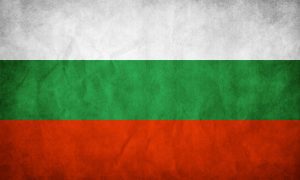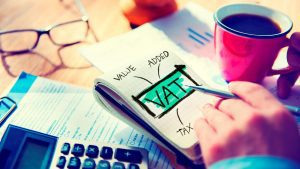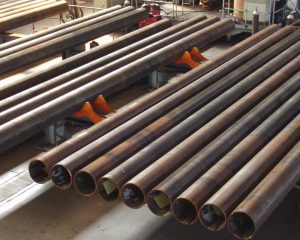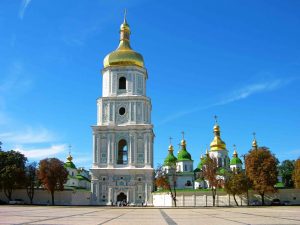
JSC Farmak will meet its output target by the end of 2020, anticipates Farmak Executive Director Volodymyr Kostiuk.
“We do not expect to go into the red this year. We will have probably get what we planned by the end of the year,” he said to Interfax-Ukraine on the sidelines of the presentation of Ukraine’s first mobile pharmaceutical museum.
Kostiuk believes that the implementation of the target indicators will be achieved, in particular, due to increased exports.
“In particular, we managed to export to other countries a lot. The Ukrainian market has contracted,” he stated.
Kostiuk noted that during the quarantine nearly 400 employees worked remotely with their salary paid in full.
“At the height of the quarantine 400 employees worked remotely. Now there are slightly fewer of them, but we are gradually increasing this number due to the worsening epidemical situation and a growing number of COVID cases. All employees on remote work receive full salaries,” he said.
Kostiuk also said that with the beginning of the coronavirus pandemic, Farmak started producing antiseptic for the company’s needs.
“We developed it very quickly basing on WHO formula to meet our company needs. We do not produce it now,” he said.
Kostiuk also said Farmak continues clinical trials on the effectiveness of the company’s Amizon drug in treating COVID-19 infected patients.
Farmak is the leader of the Ukrainian pharmaceutical market with a 5.9% stake in monetary terms.
Over the past five years, Farmak’s investments in the scientific and technical complex, production equipment and research activities amounted to UAH 3.4 billion.

Ukraine and Bulgaria have agreed to expedite the opening of the Ukrainian Cultural Center in Sofia and the Bulgarian secondary school in Odesa, Ukrainian Foreign Minister Dmytro Kuleba said.
“We are talking about more than 200,000 people and the largest Bulgarian community in the world. I want to state very clearly now that Ukrainian Bulgarians are part of the national wealth of Ukraine and an integral part of our society. We agreed with the colleague that we will resolve in a constructive spirit all issues related to education, both with the Ukrainian language in Bulgaria and the Bulgarian language in Ukraine. And today, in order for this process to become very practical, we have agreed and accelerate the opening of the Ukrainian Cultural Center in Sofia and the Bulgarian High School in Odesa,” said Kuleba at a joint briefing with the Bulgarian Foreign Minister in Kyiv on Thursday.
Kuleba also thanked Bulgaria for being a reliable friend and partner of Ukraine on the way to EU and NATO membership.
Earlier, Minister of Foreign Affairs of Ukraine and Deputy Prime Minister, Minister of Foreign Affairs of Bulgaria Ekaterina Zakharieva also laid flowers at the Wall of Memory at the St. Michael’s Golden-Domed Cathedral, honoring the memory of the soldiers who died, defending the sovereignty and territorial integrity of Ukraine.

The Verkhovna Rada at first reading passed bill No. 3656 on amending the Tax Code of Ukraine with regard to the rate of value added tax on transactions for the supply of certain agricultural products that proposes to reduce the VAT rate from 20% to 14% for the agricultural sector. Some 233 MPs voted in favor of the draft law concerned.
The document provides for amending Paragraph 193.1 of Article 193 of the Tax Code of Ukraine by adding a new subparagraph ‘g’ and establishing 14% VAT on operations for supply to the customs territory and admission into the customs territory of Ukraine of agricultural products classified by the following foreign economic activity codes: 0102 (live bovine animals); 0103 (live swine); 0401 (regarding whole milk), 1001 (wheat), 1002 (rye), 1003 (barley), 1004 (oats), 1005 (corn), 1201 (soybeans), 1204 00 (linseed), 1205 (rapeseeds), 1206 00 (sunflower seeds), 1207 (other oil seeds and oleaginous fruits,), 1212 91 (sugar beet).
“First of all, such a reduction will reduce the tax burden on agricultural producers that in turn will reduce the cost of raw materials by the amount of VAT reduction exactly for processors of such products, whereas, in general, reducing the VAT rate on transactions for selling grains, oilseeds and whole milk will not lead to budget losses, since these goods are not sold to the final manufacturer that is actually VAT payer,” said Mykola Solsky, the head of the Ukrainian Parliamentary Committee on Agrarian Policy and Land Relations, at the presentation of the bill.
According to the explanatory note to the document, which refers to the analysis carried out by UCAB based on data from the USDA and market operators for certain types of oilseeds and grains (sunflower, rapeseed, corn), reducing the VAT rate from 20% to 14% will not lead to large-scale distortions in the structure of VAT receipts/losses for any of the stakeholders (state/enterprise).

The main pipe enterprises of Ukraine in January-August of this year reduced production of pipes from ferrous metals, according to recent data, by 27% compared to the same period last year, to 539,100 tonnes, in particular in August 69,300 tonnes were produced.
The Ukrtruboprom association told Interfax-Ukraine that the enterprises of the association, in particular, for the eight months of the year reduced production of pipes by 34.7%, to 351,400 tonnes, including 45,500 tonnes in August.
Pipe production at Interpipe Nyzhniodniprovsky Pipe Rolling Plant for the indicated period decreased by 43.9%, to 95,100 tonnes (13,100 tonnes in August), at Interpipe Novomoskovsk Pipe Plant by 33.3%, to 51,000 tonnes (7,600 tonnes). Interpipe Niko Tube reduced production by 26.6%, to 191,500 tonnes (23,500 tonnes).
Dnipropetrovsk Pipe Plant produced 300 tonnes of pipes, while in January-August 2019 some 15,700 tonnes of products were made, Centravis reduced production by 10.9%, to 12,300 tonnes (1,100 tonnes).
Trubostal plant reduced its output by 33.3%, to 1,200 tonnes of pipes.

Double liability company Interchem (Odesa) and PrJSC Darnitsa pharmaceutical firm (Kyiv), together with the Zagoriy Foundation, have implemented a project to drain the foundations and walls of the Saint Sophia’s Cathedral and adjacent monasteries from excess moisture using the BioDry Swiss technology.
Director General of the Sophia of Kyiv national conservation area Nelia Kukovalska said at the presentation of the project on Wednesday, the project cost was UAH 4 million, the pharmaceutical companies provided UAH 2 million each.
“At present, the humidity of the walls and foundations of the Saint Sophia’s Cathedral is three to four times higher than it is normal. The use of BioDry technology will reduce the humidity by a third during the first year, and within three to four years it will reach the normal humidity of the monument,” she said.
Kukovalska said that currently BioDry equipment is installed in all monuments of the Saint Sophia’s Cathedral.
“The walls of the cathedral do not have waterproofing and are being damaged. When we learned about the threat to the Saint Sophia’s Cathedral due to excessive moisture, we did not hesitate for a second. We were able to find partners with whom we implemented this project. Today, we see moisture leaving the walls, Sophia he is “recovering.” We are glad that we helped the main symbol of spirituality to survive,” Director General of the pharmaceutical company Interchem Anatoliy Reder said.
In turn, Board Chairman of Darnitsa Group Dmytro Shymkiv said that for the implementation of the project the most innovative solution was found, which is used to preserve cultural monuments in the world.
“This technology is biocompatible with the environment. It already works and naturally eliminates the prime cause of moisture in the foundation and walls,” he said.
Co-founder of the Zagoriy Foundation Kateryna Zagoriy said that “the reconstruction of the Saint Sophia’s Cathedral during the time of Ivan Mazepa was a symbol of the restoration of Ukraine after the Ruins.”
“I am confident that this joint project of the pharmaceutical companies will become another important step towards restoring the culture of charity in our country,” she said.
For his part, Eustratius (Zorya), Deputy Head of the External Church Relations department of the Orthodox Church of Ukraine (OCU) said that at present in Ukraine “a huge number of churches are being destroyed.”
“It is important for Ukrainian society to form a culture of patronage. With all due respect to the state, the patron will always invest more effectively in projects. We, the OCU, are working to attract patrons through the structures that our church has created, including through the Mazepa Foundation created by the Metropolitan’s Foundation of the Orthodox Church of Ukraine to implement projects for the preservation and support of monuments. We have a huge number of monuments, more than the number of patrons,” he said.
Eustratius said that, despite the fact that “over the past 30 years, much has been done to revive churches, hundreds of churches throughout Ukraine need to be taken care of, and dozens of churches require prompt intervention to preserve them.”
“Usually these are churches that are located in villages. They are in such a state that local communities are not able to support them,” he said.
Kukovalska said that the Bursa (Seminary) building on the territory of the Saint Sophia’s Cathedral is currently in the most critical condition, the cost of restoration of which is about UAH 162 million.
“Today, there is a big problem that has not been resolved for years and can lead to the destruction of the 17th century monument. Unfortunately, the tenant has not left for two years, he does not vacate the premises. We fear that in the near future serious destruction may occur, some of the premises will perish,” she said.

Oil transit through Ukraine by pipeline to European countries and Belarus in January-August 2020 increased by 7.6% (by 607,500 tonnes) compared to the same period in 2019, to 8.630 million tonnes, according to data from JSC Ukrtransnafta.
The volume of oil transportation to refineries of Ukraine during this period amounted to 1.707 million tonnes, which is 12.2% more than in January-August 2019. In particular, oil transportation along the Odesa-Kremenchuk route amounted to 747,100 tonnes.
Thus, for the eight months of this year, the share of transit volume in the total transportation of oil (10.337 million tonnes) amounted to 83.5%, the share of pumping to the country’s refineries 16.5%.
In August 2020, oil transit through Ukraine by pipeline decreased by 9.2% compared to the same month last year, to 1.262 million tonnes.
Pumping to Ukrainian refineries last month decreased by 0.9%, to 225,600 tonnes. In particular, transportation of Ukrainian oil amounted to 117,100 tonnes, Azerbaijani 43,000 tonnes, and American some 65,400 tonnes.